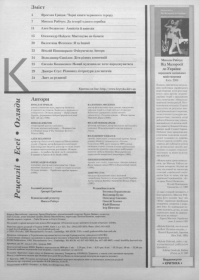Amnesty and amnesia In Krytyka, No. 5 (31), 2000, pp. 11-15.
Keywords:
totalitarianism, communism, Nazism, HolocaustSynopsis
The article is based on a 1999 lecture by Alain Besancon at the University of Warsaw. The text consists of nine parts. Besancon criticizes our asymmetrical perception of communism and Nazism: while there is a “hypermnesia” about the crimes of Nazism, the crimes of communism are subjected to amnesia and amnesty. Referring to Raoul Hilberg's The Destruction of the European Jews, he compares Nazism and the Soviet version of communism. It is argued that the means common to Nazism and communism were expropriation, exile in concentration camps, mobile extermination operations, and deportation. Unlike the Nazis, the communist government did not create death camps and used such means of destruction as judicial reprisals and famine. While the crimes of Nazism targeted specific social groups, virtually anyone could become an enemy in the eyes of the communist regime. Besancon examines the ideologies of Nazism and Communism from a theological perspective, arguing that they both contain the secularized idea of Christian messiahship, Pelagianism, and elements of Gnosticism. The article concludes with his reflections on the uniqueness of the Shoah.
Downloads




